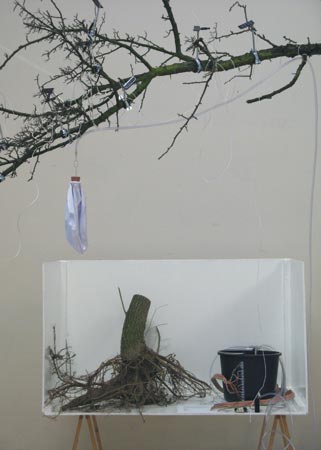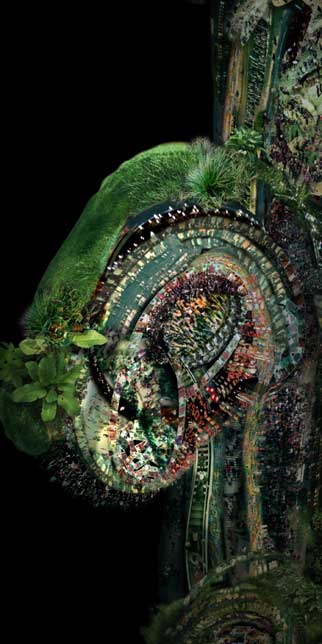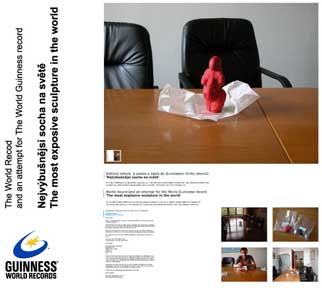 |
| Pavel
Sterec, Symbiont, 2007 |
 |
|
| Jakup
Nepraš, Babylon plant01, from Cultures, 2006 |
 |
|
| Pavel
Tichon, Guinness World Records, 2006 |
|
|
|
Cosmopolitics:
New Media Art from the Czech Republic
Curated by Denisa Kera and Pavel Sedlak
The
Czech new media art scene could be characterized by a latecomer
strategy which in recent years is turning its disadvantages into
a source of advantage. As video art and other trends from the 1980s
and 1990s were never strong in the Czech art academies, young artists
feel free to experiment and often develop very promiscuous relations
to different traditions, trends and technologies.
The exhibition presents projects from recent years that demonstrate
this playful and experimental strategy which is neither purely political
nor technological. It is cosmopolitical in a sense that it tests
the limits of our common world which we share with both machines
and nature. It examines different networks between nature, society
and technology; but also between our history, present and possible
futures. It presents challenging views of different hybrid collectives
of humans and machines. It interconnects globalization as well as
evolutionary and technological processes to examine different versions
and views of our common world; but also the possibilities of contemporary
art. The exhibition presents works by Josef Bareš, Internet
Generation, Jakub Nepraš, Jan Pfeiffer, Pavel Sterec and Pavel
Tichon.
Posthuman
networks
show art as an exploration of collectives of human and machines
and the limits between physis and techné. Pavel Sterec
work Symbiont, 2007, presents a tree with prosthesis and
a new apple of paradise which presents the intimate and balanced
relationship between the artificial and the natural. An autonomous
biorobotic plant climbing up a living tree consists of a water collector
in place of a tuber, solar panels instead of leaves, rubber tubes
and an artificial fruit. Inside the fruit there is nutritive soil
in which microorganisms reproduce. After gradual "ripening"
the "fruit" is released due to excessive pressure. It
falls down, where it fertilises the host tree. A "seed",
which is actually an SD card is placed inside the fruit. All the
data necessary for the breeding of a new symbiont is put into the
card. A microcontroller guarantees the accuracy of the growth process
and is in control of the whole procedure. Symbiont offers nutrients,
which promote the growth of the host plant, in exchange for better
access to light (i.e. Solar panels in the treetop).
In his works Generator-P730 and Cultures, both 2005,
Jakup Nepraš questions subjects like the urban reality and
environmental problems. In the video a common circuit board has
been transformed into a media microcosm: the everyday life of a
town with its inhabitants takes place between connections, cables,
and hard disks. The boundaries between real and edited images are
technically so perfectly blurred, that it takes a few moments, until
the illusion of the work reveals itself to the spectator.
Global networks
understand art as exploration of new distribution channels and
popular media: world records, torrents etc.
In his video Xiaozhu, 2006, Josef Bareš gives an instruction
on how to survive on the global market as an artist while competing
with cheap pirate copies. While others sell Chinese art to make
money, there is always someone who will try the more challenging
thing and sell art to the Chinese. The screening includes a selection
of animations from the hawked DVD.
Post-totalitarian networks
show art as exploration of technology, time and politics.
In his work Short Cuts, 2006, Jan Pfeiffer uses Google map
as the camera to the past, video as a means to understand our present,
politics and art.
The group Internet Generation tells us: "Artwork is a file!
Everything is a FILE! DIGITIZE everything that is analogue! SHARE
all that is digital! PROGRAM and develop new software for files!"
Denisa
Kera
|
|







